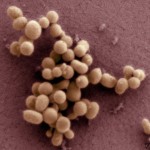 The bacteria that acted as the raw material for this experiment. Life is a rather difficult thing to define, but there are a few aspects that most biologists would agree on: it has to maintain genetic material and be able to make copies of itself. Both of these require energy, so it also must host some sort of minimal metabolism. In large, complex cells, each of these requirements takes hundreds of genes. Even in the simplified genomes of some bacteria, the numbers are still over a hundred. But does this represent the minimum number of genes that life can get away with? About a decade ago, researchers started to develop the technology to synthesize a genome from scratch and then put it in charge of a living cell. Now, five years after their initial successes, researchers used this model to try to figure out the genetic minimum for life itself. At first, the project seemed to be progressing well. In 2008, the team described the tools it had developed that could build the entire genome of a bacterium. (The team used a parasitic bacteria called Mycoplasma genitalium that started with only 525 genes.) Two years after that, they managed to get a genome synthesized using this method to boot up bacteria , taking the place of the normal genome. Read 15 remaining paragraphs | Comments
The bacteria that acted as the raw material for this experiment. Life is a rather difficult thing to define, but there are a few aspects that most biologists would agree on: it has to maintain genetic material and be able to make copies of itself. Both of these require energy, so it also must host some sort of minimal metabolism. In large, complex cells, each of these requirements takes hundreds of genes. Even in the simplified genomes of some bacteria, the numbers are still over a hundred. But does this represent the minimum number of genes that life can get away with? About a decade ago, researchers started to develop the technology to synthesize a genome from scratch and then put it in charge of a living cell. Now, five years after their initial successes, researchers used this model to try to figure out the genetic minimum for life itself. At first, the project seemed to be progressing well. In 2008, the team described the tools it had developed that could build the entire genome of a bacterium. (The team used a parasitic bacteria called Mycoplasma genitalium that started with only 525 genes.) Two years after that, they managed to get a genome synthesized using this method to boot up bacteria , taking the place of the normal genome. Read 15 remaining paragraphs | Comments
See more here:
Minimalist genome—only 473 genes—synthesized and used to boot up a cell







